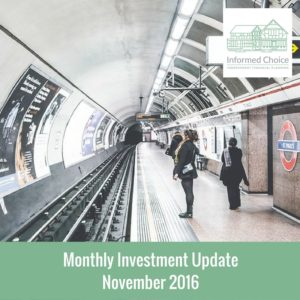 In our latest monthly investment update for November 2016, we look at how the investment markets, global economy and commodity prices are performing.
In our latest monthly investment update for November 2016, we look at how the investment markets, global economy and commodity prices are performing.
The FTSE 100 index of leading UK company shares finished October at 6,954.22, up by 34.8 points or 0.50% during the month.
The index rose for a fifth consecutive month in October, representing its longest run of monthly growth since early 2013. The largest listed companies in London have been boosted by a rally in the banking and mining sectors.
Earlier in the month, the index recorded a record high of 7,129.83 points. Valuations have been bolstered by a weaker pound, following Britain’s decision to leave the European Union in June. This weaker Pound Sterling helps the predominantly international index, where many firms have overseas revenue which becomes more profitable when the pound has fallen.
This post-Brexit bounce is not expected by analysts to last, with some pointing to the outcome of the US Presidential election next week and upcoming US Federal Reserve interest rate decision as potential tipping points for investors.
Uncertainty about the outcome of the US election has also prompted a retreat in Asian stocks at the end of October. Investors in Asia are also waiting for a series of key events in early November, including central bank policy meetings in Japan and the US, and the release of new US jobs figures.
In a letter to investors, hedge fund manager Crispin Odey has claimed Britain is destined to experience a recession. He believes the Bank of England had engineered an unsustainable situation in which company earnings have fallen but the stock market continues to rise.
“What the UK is promising is rising wages, recession, inflation and falling profits,” said Odey. “Not exactly the prize that ticket holders in the FTSE and the gilt market have paid up for.”
The latest economic growth estimates in the UK have confounded gloomy post-Brexit predictions, showing growth of 0.5% in the wake of the referendum result. The economy grew by a better than expected 0.5% between July and September, according to the Office for National Statistics. In contrast to these positive, figures, HM Treasury had predicted the British economy would shrink 0.1% over the quarter.
The latest Markit/CIPS purchasing managers’ index (PMI) for manufacturing found the sector remains on a firm footing, with a weaker pound boosting exports. The index had a reading of 54.3 in October, with a figure above 50 suggesting growth in the manufacturing sector. It was down slightly from the 55.5 recorded in September.
Oil prices reached one-month lows at the start of November, with renewed doubts over whether OPEC will follow through with its proposed output cuts. New data this month is expected to show the US is building crude inventory, with their stockpiles expected to have risen by 1 million barrels last week after unseasonal declines in seven of the past eight weeks.
UK interest rates were left unchanged at 0.25%, with the Bank of England now following an eight meetings a year timetable and the next Monetary Policy Committee meeting scheduled for November. An interest rate cut before the end of this year is looking less likely in light of a falling pound and better than expected economic growth. Higher price inflation driven by rising import costs is unlikely to prompt the Bank to hike interest rates.
Price inflation in the UK rose sharply for the year to September, with the Consumer Prices Index (CPI) measure at 1% in September. This was up from 0.6% in August and remains below the Bank of England target of 2%. It was pushed higher by rising prices for clothes, hotel rooms and petrol. It was the largest month on month increase in price inflation since June 2014.
New analysis of the UK housing market has forecast it will remain reasonably strong and active during the coming years. The forecast from property firm JLL says that there will still be moderate growth with the residential housing market picking up again from 2020 onwards. JLL forecasts growth of 0.5% across the UK in 2017 and 1% in 2018 followed by 2% in 2019, then 4% in 2020 and 5% in 2021.
The benchmark 10 year UK Gilt yield stands at 1.281% at the start of November; rising over the past month but remaining very low.
£1 buys $1.22410 or €1.10710. The Forex Gold Index is $1,284.00/oz and the Silver Index is $18.24/oz.

